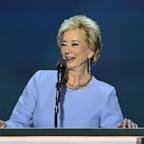Final thoughts: A more aggressive debate than last month's
This was a weird debate, full of interruptions and crosstalk. I'm skeptical anyone actually "broke through" in some huge, game-changing way, and neither of the candidates I closely monitored — Haley or Christie — looked likely to suddenly gain 10 points in the polls next week.
But I did think Haley mostly had a strong night, building on her well-received showing in the first debate. She made the case for a more restrictive approach to border security, dinged Biden for his handling of the economy and immigration, and argued that TikTok is a huge danger to the country. That said, I do wonder if she might've rubbed some viewers the wrong way by saying she felt dumber after listening to Ramaswamy, and with her interruption-filled argument with Scott late in the debate. I say that because of how women are sometimes perceived in those sorts of situations — female candidates in the past have been tagged with misogynistic descriptors like "shrill," for instance. I look forward to seeing the post-debate 538/Washington Post/Ipsos poll to get a better read on how she came across.
As for Christie, he continued to be the one person in the room unafraid of attacking Trump, doing it on a good share of his answers. On the one hand, he's got nothing to lose as the GOP candidate with the worst favorability rating among Republican voters. On the other hand, his dings did occasionally free up opportunities for other candidates to make small digs at Trump without going after the former president as aggressively as Christie did. (For instance, DeSantis took a shot at Trump for adding significantly to the national debt after Christie brought it up.) Christie probably knows that he's got no chance of winning the GOP nomination, but he may also be thinking strategically about how he can help his party avoid renominating Trump. Still, it's going to take some pretty drastic changes in the race for that outcome — Trump winning the GOP primary — to not come to pass.
—Analysis by Geoffrey Skelley of 538




